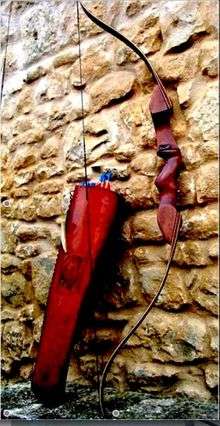Definify.com
Webster 1913 Edition
Quiver
Quiv′er
(kwĭv′ẽr)
, Adj.
Nimble; active.
[Obs.]
“ A little quiver fellow.” Shak.
Quiv′er
,Verb.
I.
[
imp. & p. p.
Quivered
(kwĭv′ẽrd)
; p. pr. & vb. n.
Quivering
.] [Cf.
Quaver
.] To shake or move with slight and tremulous motion; to tremble; to quake; to shudder; to shiver.
The green leaves
quiver
with the cooling wind. Shakespeare
And left the limbs still
quivering
on the ground. Addison.
Quiv′er
,Noun.
The act or state of quivering; a tremor.
Quiv′er
,Noun.
[OF.
cuivre
, cuevre
, coivre
, LL. cucurum
, fr. OHG. chohhāri
quiver, receptacle, G. köcher
quiver; akin to AS. cocor
, cocur
, cocer
, D. koker
. Cf. Cocker
a high shoe.] A case or sheath for arrows to be carried on the person.
Beside him hung his bow
And
And
quiver
, with three-bolted thunder stored. Milton.
Webster 1828 Edition
Quiver
QUIV'ER
, n.A case or sheath for arrows.
Take the quiver and thy bow. Gen. 27.
QUIV'ER
,Adj.
QUIV'ER
, v.i.1.
To shake or tremble; to quake; to shudder; to shiver. This word expresses that tremulous motion of the body which proceeds from loss of heat or vigor. Thus persons quiver with fear or with cold.He quiver'd with his feet and lay for dead.
And left the limbs still quiv'ring on the ground.
2.
To play or be agitated with a tremulous motion.The green leaves quiver with the cooling wind.
The lakes that quiver to the curling breeze.
Definition 2026
quiver
quiver
English

bow and quiver
Noun
quiver (plural quivers)
- (weaponry) A container for arrows, crossbow bolts or darts, such as those fired from a bow, crossbow or blowgun.
- 1598, William Shakespeare, Much Ado about Nothing, Act I, Scene I, line 271:
- Don Pedro: Nay, if Cupid have not spent all his quiver in Venice, thou wilt quake for this shortly.
- 1786, Francis Grose, A Treatise on Ancient Armour and Weapons, page 39:
- Arrows were carried in quiver, called also an arrow case, which served for the magazine, arrows for immediate use were worn in the girdle.
- 1598, William Shakespeare, Much Ado about Nothing, Act I, Scene I, line 271:
- (figuratively) A ready storage location for figurative tools or weapons.
- He's got lots of sales pitches in his quiver.
- (obsolete) The collective noun for cobras.
- Shaking or moving with a slight trembling motion.
- (mathematics) A multidigraph.
Translations
arrow container
|
|
a ready storage location for figurative tools or weapons
collective noun for cobras
shaking or moving with a slight trembling motion
References
- ↑ Robert K. Barnhart, ed., Barnhart Dictionary of Etymology, s.v. “quiver” (H.W. Wilson, 1988), 878.
- ↑ Wolfgang Pfeifer, ed., Etymologisches Wörterbuch des Deutschen, s.v. “Köcher” (Munich: Deutscher Taschenbucher Vertrag, 2005).
Etymology 2
From Middle English cwiver, from Old English *cwifer
Adjective
quiver (comparative more quiver, superlative most quiver)
- (archaic) Nimble, active.
- 1598, William Shakespeare, Henry V, Part II, Act III, Scene II, line 281:
- […] there was a little quiver fellow, and 'a would manage you his piece thus; and 'a would about and about, and come you in and come you in.
- 1598, William Shakespeare, Henry V, Part II, Act III, Scene II, line 281:
Etymology 3
From Middle English quiveren, probably from the adjective.
Verb
quiver (third-person singular simple present quivers, present participle quivering, simple past and past participle quivered)
- (intransitive) To shake or move with slight and tremulous motion; to tremble; to quake; to shudder; to shiver.
- 1593, William Shakespeare, Titus Andronicus, Act II, Scene III, line 12:
- The birds chaunt melody on every bush, / The snake lies rolled in the cheerful sun, / The green leaves quiver with the cooling wind / And make a checker'd shadow on the ground.
- Addison
- And left the limbs still quivering on the ground.
- 1593, William Shakespeare, Titus Andronicus, Act II, Scene III, line 12:
Translations
shake or move with slight and tremulous motion
|
|